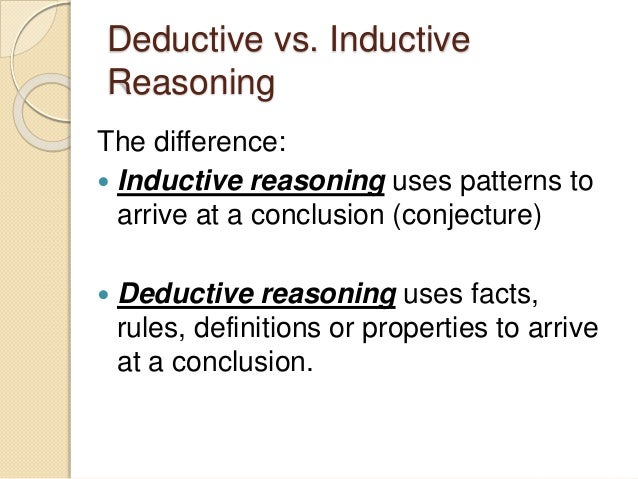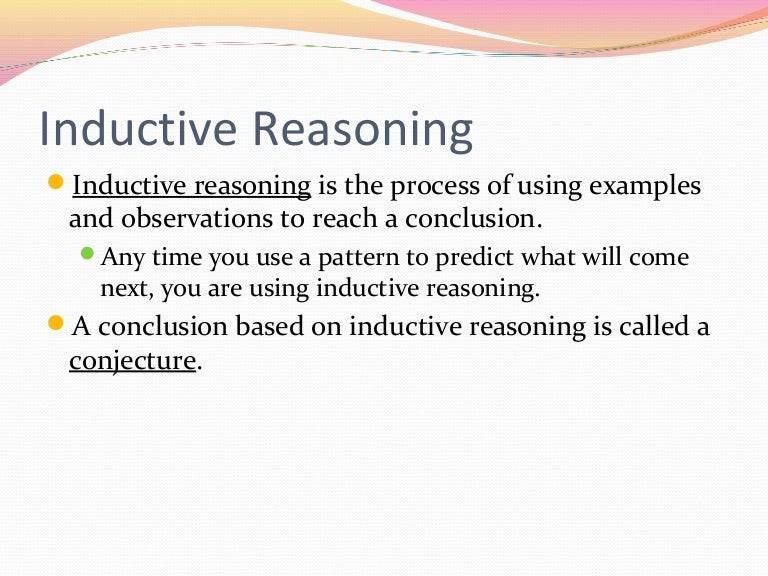The basis of inductive reasoning is behaviour or pattern. About Press Copyright Contact us Creators Advertise Developers Terms Privacy Policy Safety How YouTube works Test new features Press Copyright Contact us Creators.
 Difference Between Inductive And Deductive Approach
Difference Between Inductive And Deductive Approach
Arguments can be strong and cogent but never valid or sound that is certain.

Inductive vs deductive. Another type of reasoning inductive is also used. On the other hand deductive reasoning starts with premises. Often people confuse deductive reasoning with inductive reasoning and vice versa.
Starts with informationevidence and works towards a broader theory. Inductive reasoning is also known as informal logic. The initial point of inductive reasoning is the conclusion.
Deductive reasoning is sometimes described as a top-down form of logic while inductive reasoning is considered bottom-up What is a Deductive Argument. Deductive logic is used when there is a discrete set of hypotheses or options such as when trying to find the root cause of a process issue or trying to optimize a discrete system. Deductive reasoning or deduction is making an inference based on widely accepted facts or premises.
This approach is very teacher-centred. Based on observations conversations stuff youve read. While inductive reasoning uses the bottom-up approach deductive reasoning uses a top-down approach.
In the study of logical reasoning arguments can be separated into two categories. P87 it does not mean that deductive approaches are inherently incorrect. Deductive approach concentrates on testing the existing theories.
Deductive approach concentrates on testing the existing theories. Most social research however involves both inductive. A deductive argument is one in which true premises guarantee a true conclusion.
Inductive research approach mainly focuses on formulation of new hypothesis from data collected. You can induce that the soup is tasty if you observe all of your friends. In a deductive classroom the teacher conducts lessons by introducing and explaining concepts to students and then expecting students to complete tasks to practice the concepts.
Deductive reasoning is more narrow and is generally used to test or confirm hypotheses. Inductive logic is known as bottom-up logic which starts with selective observations and. If a beverage is defined as drinkable through a straw one could use deduction to determine soup to be a beverage.
Inductive reasoning or induction is making an inference based on an observation often of a sample. Although the inductive approach certainly represents the root of qualitative inquiry Mayan 2009. Historically this method of reasoning came about much later than deductive logic with early modern philosopher Francis Bacon who in 1620 stated that the natural world can only be uncovered by using processes of inductive reasoning.
Inductive Reasoning vs Deductive reasoning During the scientific process deductive reasoning is used to reach a logical true conclusion. By nature inductive reasoning is more open-ended and exploratory especially during the early stages. The main difference between inductive and deductive reasoning is that while inductive reasoning begins with an observation supports it with patterns and then arrives at a hypothesis or theory deductive reasoning begins with a theory supports it with observation and eventually arrives at a confirmation.
Conversely inductive instruction is a much more student-centred approach and makes use of a strategy known as noticing. Inductive vs Deductive Reasoning What are the Main Differences. On the other hand inductive logic is in the inverse of deductive logic taking observations or facts and creating hypotheses or theories from them.
Inductive reasoning is supported by inductive logic for example. Using a particular set.
This rifle recoils when it is fired.

Inductive logic definition. Inductive reasoning is the process of reasoning from the specific to the general. Inductive logic is known as bottom-up logic which starts with selective observations and facts that lead to generalizing and inducing potential hypotheses or theories. Inductive approach also known in inductive reasoning starts with the observations and theories are proposed towards the end of the research process as a result of observations.
In an inductive argument a rhetor that is a speaker or writer collects a number of instances and forms a generalization that is meant to apply to all instances. Inductive reasoning is a method of logical thinking that combines observations with experiential information to reach a conclusion. Using a particular set of facts or ideas to form a general principle.
1 Inductive reasoning is an important critical thinking skill that many employers look for in their employees. Inductive Bedeutung Definition inductive. About Press Copyright Contact us Creators Advertise Developers Terms.
Inductive logic definition is - a branch of logic that deals with induction. Inductive reasoning is an example of an analytical soft skill. Also called inductive reasoning.
Inductive logic is a form of reasoning that uses premises or observations to draw a likely conclusion. Inductive research involves the search for pattern from observation and the development of explanations theories for those patterns through series of hypotheses 2. The quality of an argument depends on at least two factors.
When you can look at a specific set of data and form general conclusions based on existing knowledge from past experiences you are using inductive reasoning. Inductive logic programming is a branch of machine learning that is concerned with learning logic programs inductively from examples in structural domains. From specific propositions such as.
A Barrel of Bad Apples Imagine there is a barrel of 100 apples and 5 apples are picked from the barrel and they were all rotten. This raven is a black bird. Inductive logic uses observations to draw a likely conclusion.
Unlike deductive logic which guarantees the truth of a conclusion based on incontrovertible evidence inductive logic can at best suggest that a conclusion is highly probable based on. Induction is a method of reasoning that moves from specific instances to a general conclusion. INDUCTIVE Logic is the study of the quality of arguments.
All ravens are black birds. The logic or theory of the methods and reasonings of empirical science. An argument consists of a set of premises and a con clusion.
Inductive reasoning is an approach to logical thinking that involves making generalizations based on specific details. The truth of the premises and the 475. Contrast with deduction.
